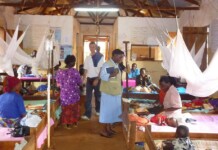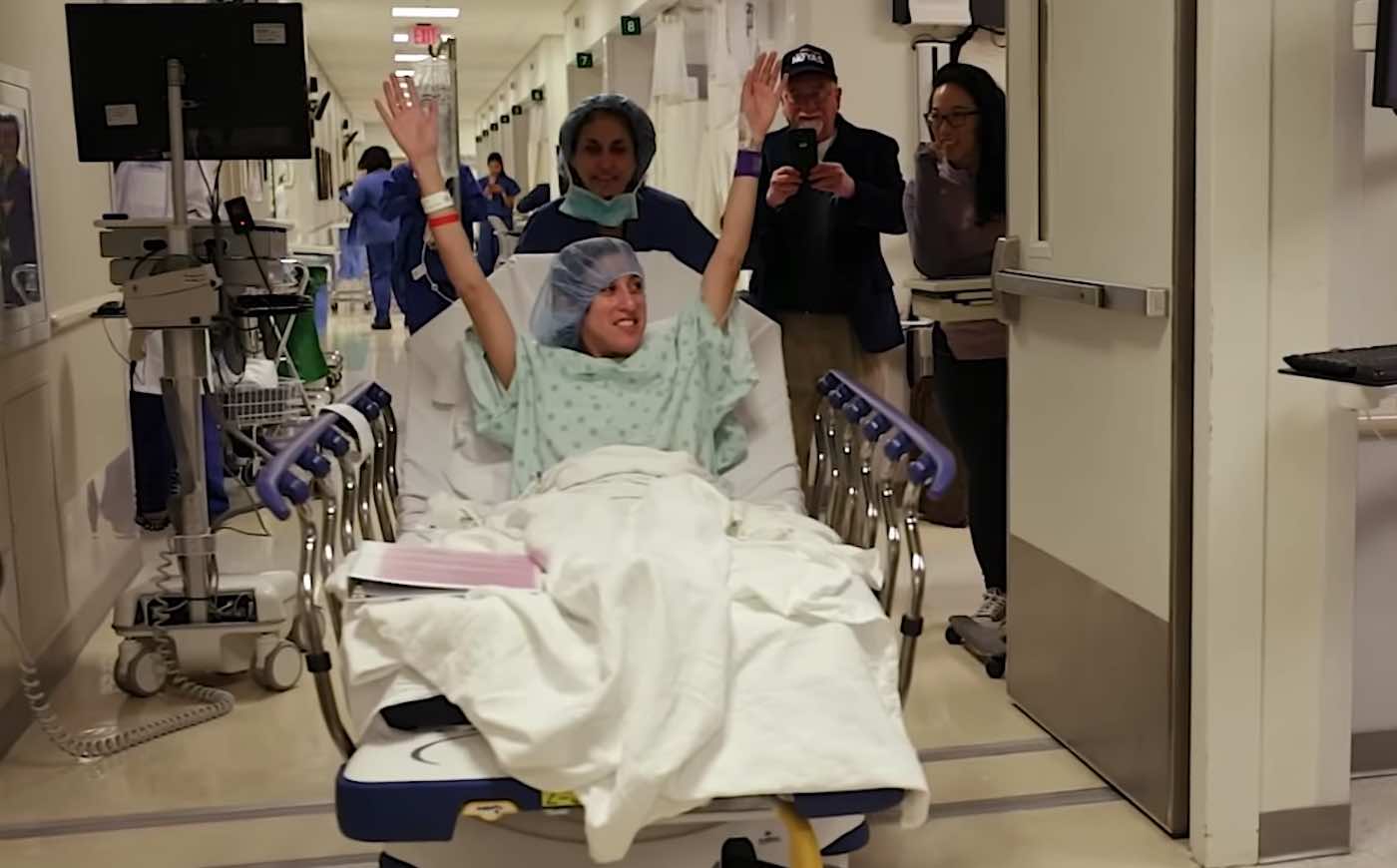For the first time in history, a person living with HIV has donated a kidney to a transplant recipient also living with HIV.
A multidisciplinary team from Johns Hopkins Medicine completed the living donor HIV-to-HIV kidney transplant earlier this week and doctors say that both the donor and the recipient are doing well.
“This is the first time someone living with HIV has been allowed to donate a kidney, ever, in the world, and that’s huge,” says Dorry Segev, professor of surgery at the Johns Hopkins University School of Medicine. “A disease that was a death sentence in the 1980s has become one so well-controlled that those living with HIV can now save lives with kidney donation—that’s incredible.”
People living with HIV haven’t been able to donate kidneys until now, because there were worries that HIV was too much of a risk factor for kidney disease in the donor. However, Segev and colleagues’ recent research on over 40,000 people living with HIV showed that the new antiretroviral drugs are safe for the kidney, and that those with well-controlled HIV have basically the same risks as those without HIV and are healthy enough to donate kidneys.
“What’s meaningful about the first living kidney donor—who is also living with HIV—is that this advances medicine while defeating stigma, too. It challenges providers and the public to see HIV differently,” says Christine Durand, associate professor of medicine and oncology at the university. “As patients waiting for a transplant see that we’re working with as many donors as possible to save as many lives as possible, we’re giving them hope. Every successful transplant shortens the waitlist for all patients, no matter their HIV status.”
Durand and Segev are leading HOPE in Action, an effort that encompasses multiple national studies exploring the feasibility, safety, and effectiveness of HIV-to-HIV transplantation. This innovation was made possible by Segev’s conception of and advocacy for the 2013 federal HIV Organ Policy Equity Act (the HOPE Act).
In addition to leading the team that performed the first deceased donor HOPE transplants in the United States in 2016, they are leading two NIH-funded trials of HIV-to-HIV kidney and liver transplants. This first-ever living kidney donor transplant is the next major milestone in HOPE.
MORE: New ‘Trojan Horse’ Cancer Drug Successfully Treats Patients With 6 Different Kinds of Lethal Tumors
Nina Martinez, the 35-year-old kidney donor living with HIV, unknowingly contracted the virus as a result of a blood transfusion she received as an infant. She and her family did not realize that she was HIV-positive until she was 8 years old.
Thanks to a regimen of antiviral treatments, however, she lives a healthy life as a public health consultant, marathon runner, clinical research volunteer, and policy advocate dedicated to eliminating the stigma still surrounding HIV – and this latest operation is just another example of how she is successful in doing so.
“Don’t call me a hero, call me the first,” said Martinez. “I want to see who comes next.”
CHECK OUT: Seven Years After Undergoing Experimental MS Treatment, Woman is Still Experiencing No Symptoms
Martinez first learned of the HOPE Act at the time of its passage in 2013. Yet, until she saw a storyline on the medical drama Grey’s Anatomy a few months later, she didn’t realize where her own life would intersect with kidney donation. The writers on Grey’s Anatomy created a storyline about the first living kidney donor with HIV, and Martinez saw what her future might hold.
“I was also inspired by a friend and neighbor who herself became a living kidney donor,” says Martinez. “Participating in clinical research is, for me, extremely important. I bore witness to my friend providing a lifesaving transplant, and in watching her I knew that if there was a way for me to help someone else, I had to do it. Doing so under a research protocol was very comfortable for me.”
“Some people believe that people living with HIV are ‘sick,’ or look unwell,” she added. “For me, I knew I was in good health. HIV was no longer a legal barrier to organ donation, and I never considered HIV to be a medical barrier either. As a policy advocate, I want people to change what they believe they know about HIV. I don’t want to be anyone’s hero. I want to be someone’s example, someone’s reason to consider donating.”
In July 2018, Martinez read on Facebook that a friend who also happened to have HIV needed a kidney transplant. Martinez felt compelled to look for a way to bring HOPE to her friend. Familiar with the medical research process and public health policy, she contacted Johns Hopkins.
After corresponding with Segev about the possibility of donating, Martinez traveled to Baltimore in October 2018 to undergo an evaluation for potential kidney donation at The Johns Hopkins Hospital. The tests required multiple trips for analysis to be certain that she was healthy enough to donate, which is standard in evaluating potential living kidney donors.
But, before she was cleared, her friend passed away. She attended the funeral and considered her options. Martinez, while grieving her friend, decided she was still willing to donate, now to a person she would not know—an anonymous recipient.
“Despite losing my friend to kidney disease, I wanted to move forward with donation as a way to honor them,” says Martinez. “I could do this for someone else, not because I’m special but because I’m strong. Other people living with HIV before me participated in clinical research so that I could not just survive but thrive. It was my turn to do this, for both my friend that I cared about and all people waiting on a transplant.”
During their evaluation, the surgical team confirmed Martinez had healthy kidneys and a low viral load, which met criteria required by the HOPE federal safeguards. Once cleared, she successfully donated a kidney to a recipient who wishes to remain anonymous.
In a 2018 American Journal of Transplant article, surgeons studied the factors that can identify candidates healthy enough to donate a kidney. Those with well-controlled HIV, who don’t have a history of diabetes, uncontrolled high blood pressure or protein in their urine could be healthy enough to donate.
The physicians will continue to closely monitor the recipient and the donor. In light of the new prediction factors and the highly effective antiretroviral therapy options available, the team says they’re optimistic that long-term HIV control and kidney function will be excellent.
RELATED: Scientists Develop Molecule That Can Finally Help Stop Arthritis From Wearing Down Joints
About 113,000 people are on the transplant waiting list in the United States as of March 2019, according to the United Network for Organ Sharing. Approximately 20 Americans die each day waiting for transplants; the longest transplant waitlist is for a kidney. People living with HIV who volunteer to be living donors could potentially save the lives of thousands of people living with HIV in need of transplants each year.
Since Johns Hopkins’ breakthrough transplant in 2016, there have been more than 50 deceased donors under the HOPE Act and over 100 transplant recipients under a HOPE protocol in the U.S.
“Society perceives me, and people like me, as people who bring death,” Martinez told The Washington Post before the operation. “And I can’t figure out any better way to show that people like me can bring life.”
Source: Johns Hopkins Medicine
(WATCH the emotional interview below) – Photo by Johns Hopkins Medicine
Be Sure And Share This Incredible Story With Your Friends On Social Media…




















